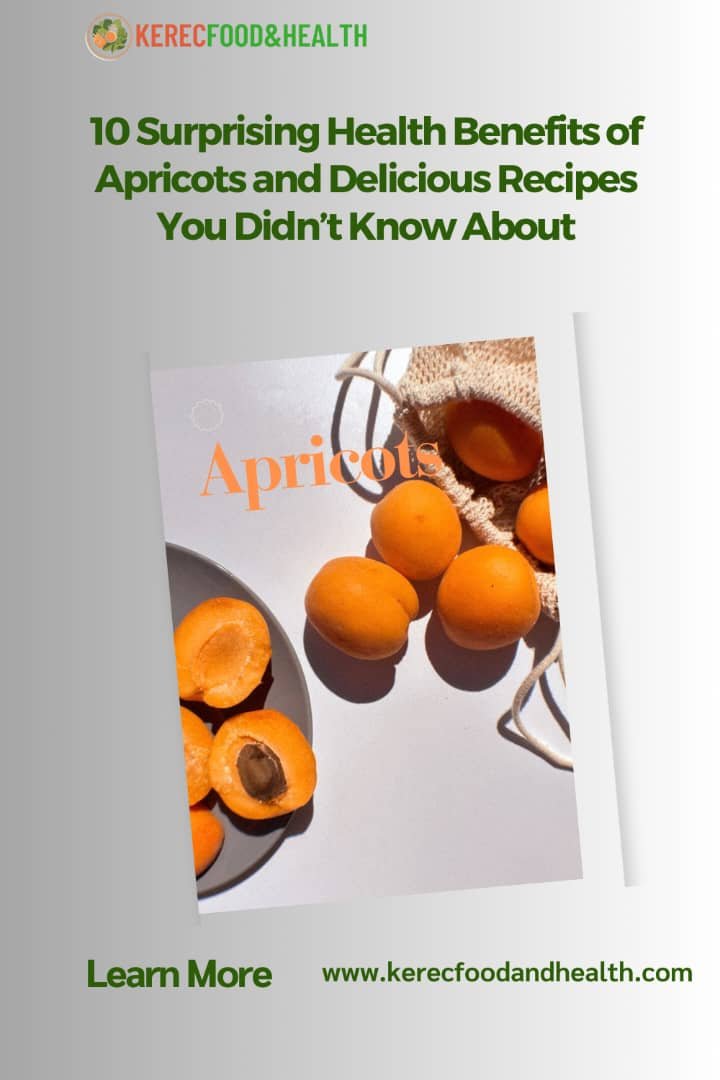When it comes to fruits, apricots often take a back seat to flashier options like mangoes or strawberries. But don’t let their small size fool you—these golden gems are nutritional powerhouses. Whether you eat them fresh, dried, or as part of a dish, apricots bring a surprising array of health benefits to the table. Let’s dive into 10 reasons why apricots deserve a spot in your diet.
10 Surprising Health Benefits of Apricots
1. Packed with Antioxidants
Did you know apricots are loaded with antioxidants like beta-carotene and vitamin C? These compounds help fight free radicals, which can damage cells and lead to chronic diseases. Regularly consuming antioxidant-rich foods like apricots may reduce your risk of heart disease, cancer, and even aging-related issues.
2. Improves Eye Health
Your eyes work hard daily, and apricots can help keep them in top shape. Thanks to high levels of vitamin A and lutein, apricots support healthy vision and may protect against age-related macular degeneration and cataracts.
3. Enhances Skin Glow
Who doesn’t want radiant skin? Apricots are rich in vitamin C, which promotes collagen production, helping to reduce wrinkles and improve skin elasticity. Plus, their beta-carotene content protects your skin from harmful UV rays.
4. Supports a Healthy Heart
Heart disease is a leading cause of death worldwide, but apricots can help reduce your risk. They’re a great source of potassium, which helps regulate blood pressure. Additionally, their fiber content lowers cholesterol, improving overall heart health.
5. Aids in Digestion
If you struggle with digestion, apricots could be your new best friend. Their high fiber content promotes regular bowel movements, prevents constipation, and supports a healthy gut microbiome.
6. Boosts Bone Strength
Strong bones are essential, and apricots can contribute to bone health. They contain calcium, phosphorus, and potassium—key minerals that help maintain bone density and prevent conditions like osteoporosis.
7. Strengthens the Immune System
Feeling under the weather? Apricots are packed with vitamin C and phytonutrients, which enhance your immune system and help your body fight off infections. Adding apricots to your diet might just shorten your recovery time during flu season!
8. Helps with Weight Management
Snacking smartly is crucial for maintaining a healthy weight, and apricots fit the bill perfectly. They’re low in calories but high in fiber, helping you stay full longer while keeping your caloric intake in check.
9. Promotes Hydration
With their high water content, apricots are a hydrating fruit that can help you meet your daily fluid needs. They’re especially useful after exercise, as they replenish lost electrolytes and prevent dehydration.
10. Reduces Inflammation
Chronic inflammation is linked to numerous health problems, including arthritis and heart disease. Apricots contain anti-inflammatory compounds that may help reduce swelling and pain, making them a great addition to an anti-inflammatory diet.
Final Thoughts
Apricots may be small, but they pack a big punch when it comes to health benefits. From improving your skin to protecting your heart, this fruit proves that good things really do come in small packages. So next time you’re at the store, don’t pass by the apricots—they might just be the key to a healthier you.
Can Apricots Support Digestive Health and Boost Immunity?
When we think about apricots, their sweet and tangy flavor often comes to mind. But did you know this golden fruit is more than just a tasty treat? Apricots are packed with nutrients that can work wonders for your digestive health and immune system. Let’s explore how this small but mighty fruit can benefit your overall well-being.
How Apricots Improve Digestive Health
Your digestive system plays a crucial role in your overall health, and apricots are a fantastic ally for keeping it in top shape. Here’s why:
1. Rich in Dietary Fiber
Fiber is essential for a healthy digestive system, and apricots are loaded with it. Just one cup of fresh apricots provides around 3 grams of fiber, while dried apricots offer even more. Fiber helps regulate bowel movements, preventing constipation and promoting gut health.
2. Supports Gut Microbiome
Apricots contain prebiotic fibers, which feed the beneficial bacteria in your gut. A balanced gut microbiome is linked to better digestion, nutrient absorption, and even improved mental health.
3. Natural Laxative Effect
If you’re feeling a little backed up, apricots might help. The combination of fiber and natural sorbitol (a type of sugar alcohol) in apricots can act as a gentle laxative, promoting regularity without harsh effects.
How Apricots Boost Immunity
Your immune system is your body’s first line of defense, and apricots can help fortify it. Here’s how:
1. Loaded with Vitamin C
Vitamin C is well-known for its immunity-boosting powers, and apricots are a great source. This vitamin helps stimulate the production of white blood cells, which fight infections and keep illnesses at bay.
2. Rich in Antioxidants
Apricots are packed with antioxidants, including beta-carotene and flavonoids. These compounds help neutralize free radicals, reducing oxidative stress and inflammation, which can weaken your immune system.
3. Contains Essential Nutrients
Apricots provide essential nutrients like vitamin A, which supports the integrity of your skin and mucous membranes—your body’s natural barriers against harmful pathogens.
4. Hydration for Immune Function
Staying hydrated is key to a strong immune system, and the high water content in fresh apricots makes them an excellent hydrating snack.
Can Apricots Improve Heart Health? Here’s What You Need to Know
When it comes to heart health, most of us think of avoiding unhealthy foods, but adding certain nutritious foods to your diet is just as essential. One of these heart-friendly foods might surprise you—apricots! These small, golden fruits are packed with vitamins, minerals, and antioxidants that may help support a healthy heart. Let’s explore how apricots can make a difference for your cardiovascular health and why they should have a place in your diet.
Why Apricots Are Good for Your Heart
Apricots may be small, but they’re loaded with nutrients that directly support heart health. Here are the standout reasons why apricots are a great choice for your heart:
1. Rich in Antioxidants to Fight Oxidative Stress
Oxidative stress can damage your heart over time, increasing the risk of heart disease. Apricots are rich in antioxidants, including vitamin C and beta-carotene, which help neutralize free radicals in the body. By reducing oxidative stress, apricots support a healthier cardiovascular system.
2. High in Potassium for Blood Pressure Control
Potassium is essential for heart health because it helps regulate blood pressure, a major factor in preventing heart disease. Apricots are naturally high in potassium, with just one cup providing about 10% of your daily needs. Potassium helps relax blood vessels, reducing blood pressure and easing strain on the heart.
3. Packed with Fiber to Lower Cholesterol
Fiber is known to help manage cholesterol levels, which is crucial for heart health. The soluble fiber in apricots binds to cholesterol particles, helping to remove them from the bloodstream and lowering LDL (bad) cholesterol levels. Lowering LDL cholesterol is key to reducing the risk of plaque buildup in the arteries, which can lead to heart attacks or strokes.
Specific Heart Health Benefits of Apricots
Incorporating apricots into your diet can have multiple direct benefits for your heart:
1. Reduced Risk of Hypertension
With their high potassium content, apricots can help lower blood pressure and reduce the risk of hypertension. Potassium balances the effects of sodium, which is essential for maintaining healthy blood pressure levels.
2. Improved Blood Flow
Apricots also contain iron, a mineral that supports red blood cell production and circulation. Better blood flow means more oxygen and nutrients reach the heart, supporting its function and overall health.
3. Anti-Inflammatory Benefits
Chronic inflammation can lead to heart disease, and apricots offer a natural way to reduce it. Their antioxidants and fiber both help to reduce inflammation, easing pressure on the cardiovascular system and promoting long-term heart health.
How to Add Apricots to Your Heart-Healthy Diet
Adding apricots to your diet is easy and delicious. Here are some simple ways to enjoy them for heart health:
- Snack on Fresh Apricots: Fresh apricots make an ideal snack that’s both low-calorie and nutrient-rich. They’re portable and naturally sweet, making them perfect for an on-the-go option.
- Incorporate Dried Apricots Carefully: Dried apricots are a concentrated source of nutrients but are also higher in natural sugars. Enjoy a handful with nuts as a balanced snack, but keep portions in check.
- Add to Salads: Sliced apricots add a subtle sweetness to salads and pair well with leafy greens, nuts, and lean proteins like grilled chicken.
- Blend into Smoothies: Add a few apricots to your smoothie with leafy greens and a scoop of chia seeds for a heart-healthy boost.
Final Thoughts
Apricots may be small, but their benefits for heart health are big. From reducing blood pressure to lowering cholesterol and providing anti-inflammatory benefits, these fruits can be a valuable addition to a heart-friendly diet. So next time you’re at the store, grab a handful of apricots—they might just help keep your heart in top shape.
Dried Apricots: Are They as Healthy as Fresh Apricots?
When it comes to apricots, many of us are familiar with the fresh, juicy version. But what about dried apricots? These chewy, sweet fruits are often found in our snack cabinets and used in cooking, but are they as healthy as fresh apricots? In this article, we’ll explore the nutritional benefits and potential drawbacks of dried apricots, so you can make an informed decision about which version of this fruit is right for you.
The Nutritional Breakdown: Fresh vs. Dried Apricots
First, let’s take a look at the nutritional differences between fresh and dried apricots. Although they both come from the same fruit, the drying process alters their nutrient content in a few key ways.
1. Concentration of Nutrients
Dried apricots are essentially fresh apricots that have had their water content removed, which makes them more concentrated in terms of calories, sugar, and nutrients. For example, a single dried apricot contains more sugar and calories than a fresh apricot, but it also offers a more concentrated source of vitamins and minerals, including potassium, vitamin A, and iron.
However, this concentration means that if you’re not careful with portions, dried apricots could lead to a higher calorie intake compared to fresh ones.
2. Fiber Content
Both fresh and dried apricots are high in fiber, but dried apricots have an advantage here. Since dried apricots are smaller and more condensed, they offer a higher fiber content per serving. Fiber is beneficial for digestion and helps manage blood sugar levels, so dried apricots can be a great choice for adding fiber to your diet.
The Benefits of Dried Apricots
While dried apricots are more calorie-dense, they do come with some significant health benefits:
1. Rich in Antioxidants
Just like fresh apricots, dried apricots are rich in antioxidants, including beta-carotene and vitamin C. These antioxidants help fight oxidative stress, which can damage cells and contribute to chronic diseases. In fact, the drying process may actually increase the antioxidant levels in some fruits, making dried apricots even more beneficial in this regard.
2. Good for Bone Health
Dried apricots are a good source of potassium, calcium, and magnesium—nutrients that are essential for maintaining strong bones. The concentrated form of these minerals in dried apricots can be especially helpful for people who are looking to support their bone health.
3. Boosts Iron Intake
Iron deficiency is a common concern, especially for those who follow a vegetarian or vegan diet. Dried apricots contain a fair amount of iron, which is important for the production of hemoglobin and the prevention of anemia. Including dried apricots in your diet can be an easy way to boost your iron intake.
Are There Any Drawbacks to Dried Apricots?
While dried apricots offer a host of health benefits, they also come with some considerations to keep in mind:
1. High in Sugar
Dried apricots have a higher sugar content than fresh apricots. This is because the drying process removes the water, making the sugars more concentrated. While the sugars in dried apricots are natural, it’s still important to be mindful of portion sizes—especially if you are managing blood sugar levels or trying to lose weight.
2. Potential for Added Sugars
In some cases, dried apricots are sweetened with added sugars to enhance their flavor. When buying dried apricots, it’s crucial to read the labels to make sure they don’t contain added sugars or preservatives. Opting for unsweetened dried apricots is always a healthier choice.
3. Calorie-Dense
As mentioned earlier, dried apricots are more calorie-dense than fresh ones due to the concentration of sugars and nutrients. While this can be beneficial in moderation, it’s important not to overeat dried apricots, especially if you’re watching your calorie intake. A small handful can go a long way.
Fresh or Dried Apricots: Which is Better for You?
Both fresh and dried apricots offer unique health benefits, so the answer to this question depends on your personal preferences and health goals. If you’re looking for a low-calorie, hydrating snack, fresh apricots are a great choice. On the other hand, if you need a nutrient-packed, fiber-rich snack that’s easy to carry and store, dried apricots are an excellent option.
Ultimately, it’s all about balance. Incorporating both fresh and dried apricots into your diet can provide you with a variety of health benefits, from digestive support to antioxidant protection. Just be sure to pay attention to portion sizes, especially when enjoying dried apricots, as their higher calorie and sugar content can add up quickly.
Final Thoughts
Whether you prefer fresh or dried apricots, both forms of this tasty fruit can contribute to a healthy, balanced diet. Fresh apricots are great for hydration and a low-calorie snack, while dried apricots are a concentrated source of fiber, iron, and antioxidants. The key is to enjoy them in moderation and choose the variety that fits best with your nutritional needs and lifestyle.
So, next time you’re at the grocery store, why not grab both fresh and dried apricots? That way, you can enjoy the best of both worlds!
Cooking with Apricots: 5 Delicious and Easy Recipes to Try
Apricots are not only a nutritious snack but also a versatile ingredient that can enhance a variety of dishes. Whether you’re working with fresh or dried apricots, this fruit adds a sweet and tangy flavor to both sweet and savory recipes. In this article, we’ll explore five delicious and easy apricot recipes that you can try in your kitchen today. Let’s get cooking!
1. Apricot Chicken: A Sweet and Savory Delight
This apricot chicken recipe combines the natural sweetness of apricots with the savory flavors of chicken for a deliciously balanced dish. It’s perfect for a quick weeknight dinner or a special occasion.
Ingredients:
4 chicken breasts
1/2 cup apricot preserves
2 tablespoons Dijon mustard
1 tablespoon olive oil
Salt and pepper to taste
Instructions:
1. Preheat your oven to 375°F (190°C).
2. Heat olive oil in a skillet over medium heat. Season chicken breasts with salt and pepper and cook until browned on both sides, about 4 minutes per side.
3. Mix apricot preserves and Dijon mustard in a small bowl.
4. Spread the apricot-mustard mixture over the chicken breasts.
5. Transfer the chicken to the oven and bake for 20-25 minutes or until the chicken is cooked through.
6. Serve with your favorite sides for a complete meal!
2. Apricot Jam: Homemade and Delicious
Making homemade apricot jam is simple and rewarding, and it’s a great way to preserve the fruity goodness of apricots. Spread it on toast, stir it into yogurt, or use it in baking!
Ingredients:
4 cups apricots, pitted and chopped
1 1/2 cups sugar
1/4 cup lemon juice
1/2 teaspoon vanilla extract
Instructions:
1. Place the chopped apricots, sugar, and lemon juice in a saucepan over medium heat.
2. Stir frequently and bring the mixture to a boil. Reduce the heat and simmer for about 20-30 minutes, stirring occasionally, until the jam thickens.
3. Add the vanilla extract and mix well.
4. Pour the hot jam into sterilized jars and let it cool before sealing.
5. Store in the refrigerator for up to a month.
3. Apricot and Almond Smoothie: A Healthy Breakfast Option
If you’re looking for a nutritious and refreshing breakfast, this apricot and almond smoothie is a great choice. It’s full of vitamins, antioxidants, and healthy fats, making it the perfect way to start your day.
Ingredients:
1 cup fresh or dried apricots (soaked in water if dried)
1/2 cup almond milk
1/4 cup almonds (or almond butter)
1 tablespoon honey or maple syrup (optional)
1/2 cup ice cubes
Instructions:
1. Combine all ingredients in a blender.
2. Blend until smooth and creamy.
3. Pour into a glass and enjoy as a healthy breakfast or snack.
4. Apricot Salad with Feta and Walnuts: A Light, Flavorful Dish
This apricot salad combines fresh apricots with tangy feta cheese, crunchy walnuts, and a light dressing for a refreshing and flavorful dish. It’s perfect for a summer meal or as a side dish.
Ingredients:
4 fresh apricots, pitted and sliced
1/4 cup crumbled feta cheese
1/4 cup walnuts, chopped
1 tablespoon olive oil
1 tablespoon balsamic vinegar
Salt and pepper to taste
Fresh mint leaves for garnish
Instructions:
1. In a large bowl, combine the sliced apricots, feta, and walnuts.
2. Drizzle with olive oil and balsamic vinegar.
3. Toss gently to combine and season with salt and pepper.
4. Garnish with fresh mint leaves before serving.
5. Apricot Crumble: A Perfect Dessert for Any Occasion
This apricot crumble is a simple yet indulgent dessert that showcases the natural sweetness of apricots. With a buttery topping and juicy fruit filling, it’s a great way to satisfy your sweet tooth.
Ingredients:
4 cups fresh apricots, pitted and sliced
1/2 cup sugar
1 tablespoon lemon juice
1 cup rolled oats
1/2 cup all-purpose flour
1/4 cup brown sugar
1/4 cup cold butter, cubed
1/2 teaspoon cinnamon
Instructions:
1. Preheat your oven to 350°F (175°C).
2. In a baking dish, combine the apricots, sugar, and lemon juice.
3. In a separate bowl, mix the oats, flour, brown sugar, cinnamon, and cold butter. Use a pastry cutter or your fingers to mix the butter into the dry ingredients until it forms a crumbly texture.
4. Sprinkle the oat mixture over the apricots.
5. Bake for 30-35 minutes or until the topping is golden and the apricots are bubbling.
6. Serve warm with a scoop of vanilla ice cream or whipped cream.
Final Thoughts
Apricots are a wonderfully versatile fruit that can add a burst of flavor to a wide variety of dishes. Whether you’re making savory chicken dishes, sweet jams, refreshing smoothies, or indulgent desserts, apricots offer endless possibilities in the kitchen. Try these five recipes and enjoy the natural sweetness and health benefits of apricots today!
Would you like more recipe ideas or tips for cooking with apricots? Feel free to ask!
References
National Institutes of Health (NIH) – “Health Benefits of Dried Fruits”
Harvard T.H. Chan School of Public Health – “Fiber and Heart Health”
WebMD – “Dried Apricots: Nutrition and Health Benefits”
Harvard T.H. Chan School of Public Health – “The Nutrition Source: Antioxidants”
National Eye Institute – “Nutrients for Eye Health”
Healthline – “Apricots: Nutrition Facts and Health Benefits”
USDA FoodData Central – “Apricot Nutrition Facts”
WebMD – “The Health Benefits of Apricots”
American Heart Association – “Benefits of Potassium for Blood Pressure”
Harvard T.H. Chan School of Public Health – “Dietary Fiber and Cholesterol Management”
National Institutes of Health (NIH) – “Antioxidants and Cardiovascular Health”






Pingback: Apricots and Diabetes: How This Fruit Can Fit into a Diabetic Diet
Pingback: Why Apricot are Perfect for Weight Loss